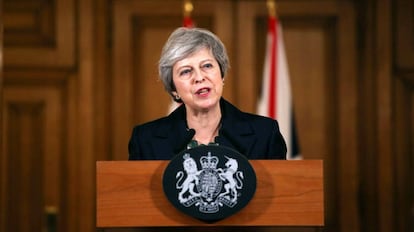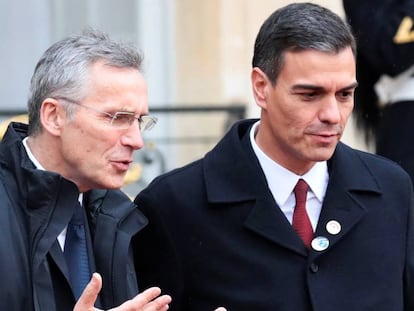Brexit: The moment of truth
No agreement would be worse and more disruptive than a mediocre one

The moment of truth has come for Brexit, the UK¡¯s withdrawal from the European Union (EU). And the process has dramatic overtones. Almost anything could happen. The draft agreement between continental negotiators and the government of Theresa May regarding the text that must organize this withdrawal has triggered a wave of protests ¨C more political than social ¨C on the island.
This is the moment of truth because it ends the semblance of an EU-UK negotiation
There has been a second set of resignations among the more radical Euroskeptics in her Cabinet (following those of Boris Johnson and David Davis). These include the official in charge of Brexit negotiations, Dominic Raab, whose decision to quit had been expected but is no less symbolic for it. To them, May¡¯s agreement makes the UK a vassal of Europe, with more obligations than rights. Meanwhile, the Europhiles have launched another barrage of criticism over the draft deal, and insisted on the need for a second referendum to correct the errors of the past. To this group, any agreement at all means fewer benefits than full membership in the EU club.
This is the moment of truth because it ends the semblance of an EU-UK negotiation, and displays what the process was really concealing all along: a domestic dialogue with no way out; an internal, tribal confrontation between the British themselves. From now on they will no longer be able to shield themselves behind impossible demands, or blame Brussels¡¯ bureaucracy for problems. From now on, UK leaders must make their own decisions: either support a soft Brexit, which May seems resigned to and which would make up for so many tribulations, or have parliament deny her a confidence vote, which would trigger early elections.
This could result in a victory by the indecisive and ambiguous Labour Party, which has pledged ¨C to its own regret ¨C to call a second referendum. If this were to happen, it would not be improbable to see a moderate, though possibly not massive, support for a return to the European project, which would bring the country back to square one.
The speed and forcefulness of the reactions to the draft deal contrast with the painstaking detail contained in the 585 pages of the agreement, which deserves a more serene attitude in order to accurately analyze all of its parts; this applies particularly to the people who are most affected by it, namely the British.
If the UK slides into chaos, nobody will be able to blame Europe for seeking rupture
But it has not been so. To put it succinctly, EU negotiators have firmly stood by all the requirements that the 27 member states made on different occasions. This has not prevented them from showing enough flexibility to make a few concessions. At first glance, it looks like these concessions have more to do with calendar dates and procedural matters than with substantial issues.
That is why, from a European perspective, the general direction of the draft agreement matters just as much as the details, or as the impact it has already had. If May manages to consolidate her teetering leadership, the mostly cosmetic concessions should pave the way for a Brexit that will always be negative in itself, but will at least no longer lead to surprising or detrimental situations. No deal would be disruptive, and thus always a worse option that any deal at all, even a mediocre one.
If, instead, the UK slides into chaos, nobody will be able to blame Europe for seeking rupture, or to use it as a scapegoat for their own mistakes. The EU has already shown a willingness to sign an agreement that it is not thrilled about.
English version by Susana Urra.
Tu suscripci¨®n se est¨¢ usando en otro dispositivo
?Quieres a?adir otro usuario a tu suscripci¨®n?
Si contin¨²as leyendo en este dispositivo, no se podr¨¢ leer en el otro.
FlechaTu suscripci¨®n se est¨¢ usando en otro dispositivo y solo puedes acceder a EL PA?S desde un dispositivo a la vez.
Si quieres compartir tu cuenta, cambia tu suscripci¨®n a la modalidad Premium, as¨ª podr¨¢s a?adir otro usuario. Cada uno acceder¨¢ con su propia cuenta de email, lo que os permitir¨¢ personalizar vuestra experiencia en EL PA?S.
?Tienes una suscripci¨®n de empresa? Accede aqu¨ª para contratar m¨¢s cuentas.
En el caso de no saber qui¨¦n est¨¢ usando tu cuenta, te recomendamos cambiar tu contrase?a aqu¨ª.
Si decides continuar compartiendo tu cuenta, este mensaje se mostrar¨¢ en tu dispositivo y en el de la otra persona que est¨¢ usando tu cuenta de forma indefinida, afectando a tu experiencia de lectura. Puedes consultar aqu¨ª los t¨¦rminos y condiciones de la suscripci¨®n digital.










































